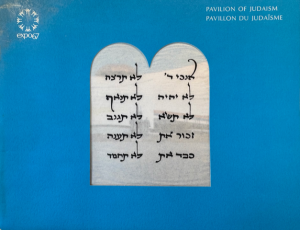 MONTREAL —He’s considered by many to be the greatest American tenor of all time. But when the late Richard Tucker is honoured May 2 at a special evening at Congregation Shaar Hashomayim, homage will also be paid to Tucker’s enduring legacy as a Jewish tenor, a great artist who was steeped in his own sense of peoplehood and religious identity as equally and as unabashedly as he was in the classics.
MONTREAL —He’s considered by many to be the greatest American tenor of all time. But when the late Richard Tucker is honoured May 2 at a special evening at Congregation Shaar Hashomayim, homage will also be paid to Tucker’s enduring legacy as a Jewish tenor, a great artist who was steeped in his own sense of peoplehood and religious identity as equally and as unabashedly as he was in the classics.
Richard Tucker as he appeared in a production of La Juive
That idea is serving as the guidepost for the Shaar’s cantor, Gideon Zelermyer, musical director Stephen Glass and native Montrealer and rising opera star Joseph Kaiser in shaping the tenor, so to speak, of the evening, which Glass and Zelermyer promise will be memorable.
Zelermyer has spent the last few months exhaustively researching Tucker’s life and legacy, including travelling to New York in preparation for the ambitious evening.
“Tucker was able to straddle both [the Jewish musical and operatic] worlds with incredible grace,” said Zelermyer, a renowned cantorial tenor in his own right and a shameless opera aficionado who had been contemplating such an evening for several years.
“The amazing thing,” Zelermyer said, “is that here was this Jewish boy from Brooklyn who made it to the greatest stages in the world, especially the Met [Metropolitan Opera],” and where he remained its greatest star for decades.
“He was the American Caruso.”
Zelermyer continued: “He was also a great Jewish ambassador, a religious man who continued to sing as a cantor on the High Holidays, made many, many liturgical recordings, and was a huge supporter and friend of Israel, visiting there many times.”
On display on Zelermyer’s computer were archival photos of Tucker with the likes of former Israeli prime ministers David Ben-Gurion and Golda Meir.
The evening, with musical direction by Glass, will integrate performances by Zelermyer and Kaiser (accompanied by Michael McMahon) of operatic, cantorial, liturgical, Israeli, Broadway and popular compositions with a multimedia presentation and historical footage.
CBC radio broadcaster Kelly Rice will oversee the interactive proceedings, and guests will include Tucker’s son, Barry, director of the Richard Tucker Musical Foundation in New York.
The concert began to take shape in earnest about two years ago, after Zelermyer met Barry Tucker in New York.
For both Glass and Zelermyer, the evening meshes perfectly with the synagogue’s – and their own – sensibility and approaches to music, which often integrate classical (as well as modern) musical motifs and idioms into the religious repertoire.
“I think Tucker’s value system was similar to our own,” Glass said. “I truly think it was.”
If anything, the two hoped the evening would accurately portray Tucker as the great tenor and abidingly decent man that he was, and as someone who successfully put both a proudly American and Jewish imprint on his art.
Born Rubin Ticker in Brooklyn in 1913, Tucker was only 28 when he became cantor at the prestigious Jewish Brooklyn Centre. Edward Johnson, general manager of the Met, came to the centre to hear him sing and soon after offered him a contract.
In January, 1945, with World War II coming to an imminent end, Ticker made his debut as Enzo in Ponchielli’s La Gioconda. His brother-in-law was another famous American-Jewish tenor, Jan Peerce, who was eight years older.
Tucker would come to be regarded as probably the leading American tenor of the post-war era, demonstrating, Zelermyer said, a very strong dramatic quality in his performances, both in opera and in his liturgical recordings.
Tucker also brought opera to mass audiences during the 1950s and 1960s by appearing on popular television programs such as The Voice of Firestone, The Bell Telephone Hour, and The Ed Sullivan Show, excerpts from which will be heard at the concert.
In 1964, Tucker performed in Montreal at a concert produced by Jewish People’s School’s Concert Society. Zelermyer noted that Tucker was not the least bit “self-consciously” Jewish, invariably including Jewish selections in recitals. Tucker was in the planning stages of a production at the Met of the French opera La Juive when he died suddenly of a heart attack in 1975 at age 61. Extraordinarily, Tucker’s funeral took place at the Met and a prominent bust of him sits in Lincoln Centre.
It’s Glass’s and Zelermyer’s hope that Tucker’s legacy will continue through the concert.
“The older generation already knows his name,” Zelermyer said. “The younger generation needs to know his legacy.”






